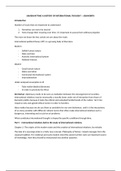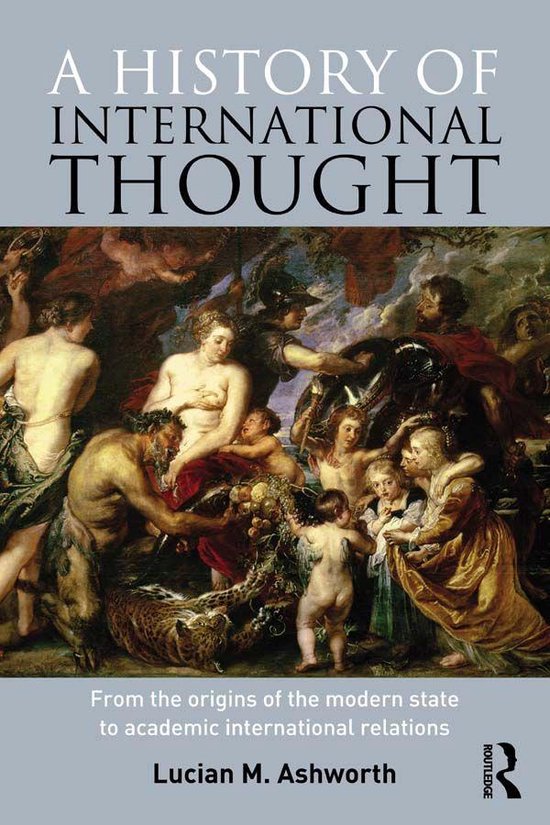SAMENVATTING A HISTORY OF INTERNATIONAL THOUGHT -- ASHWORTH
Introduction
Number of issues that are important to understand
1. Narratives can never be neutral
2. Texts change their meaning over time, it’s important to assess them without prejudice
The more we know the less certain we are about the truth.
International political theory (IPT) is a growing body of literature
Realism
- Selfish human nature
- State centrism
- Anarchic international system
- National interest
Idealist
- Good human nature
- States and other
- Communal international system
- Internationalism
Under analysed assumption in IR
- False realist-idealist dichotomy
- In order to promote the West
Der Derian: diplomacy needs to be seen as mediation between the estrangement of societies.
International relations may be necessarily a morally lower order set of interaction from those of
domestic politics because it lacks the ethical and extended familial bonds of the nation. Yet it too
requires rules and agreed ethical norms in order to function.
Ideas matter because we do use them as yardsticks for our own behaviour, and it is the interactions
of so many societies with different cultural norms that often make international relations such a
dangerous, interesting and crucial set of problems.
What constitutes international thought is shaped by specific conditions through time.
Part I – International relations before the study of international relations.
Chapter 2: The origins of the modern state and the creation of international relations, by mistake.
The idea of a sovereign state is a fairly new concept. Philosophy of history: mixed messages from the
classical tradition. For medieval and early modern mind the ancient writers were an important source
of knowledge. How they should be interpreted was another question.
,Three schools of influence
1. Classical Greek philosophical school (Plato/Aristotle)
2. Roman republican tradition (cicero; stoicism)
3. Ancient historians background and intellectual justifications for state-building in the 16 th
century (especially ideas of Tacitean)
The crisis of the early modern and rise of the state
Two big changes in Europe between 1550-1650
- Instability caused by the doctrinal conflicts of religion
- Rise of the centralised territorial state
- Feudal system is slowly exchanged by class system
- Invention of the home. Separation of public and private new political stereotype: the
ruler as a loving father
Developments that helped build large centralised states
1. The weakening of feudal ties led to the growth of monarchical power
2. The professional armed forces
3. (Zie pagina 8 in het boek voor de rest)
The new fiscal military state produces a more aggressive foreign policy while at the same time
producing a more intrusive security state at home.
The end of feudal relations: feudal loyalties became refocused on the state.
Humanism and reasons of state
- Bodin: father state idea
- Important philosophers: Lipius, Montaigne, Tacis, Cicero
In order to prevent treason the state was justified in breaking a moral law that applied to individuals.
Tacist and Cicerists: political knowledge comes from human experience expressed through history,
rather than from abstract generalisations about human behaviour
Tacitists assumed that interests would lead to peace through the acceptance of a common language
of politics interests, necessity and reason d’etat were not enough to create a stable order.
Chapter 3: Reaction and reform: patriarchal order and the enlightenment response
Enlightenment reacted to patriarchal conservatism. Both contributed to the building of an idea of
international sphere.
,A note on the treaties of Westphalia and the Westphalian myth in IR
- The development of modern state system treaties is associated with 1648 (end of thirty years
war). Critique:
o There is not one, but 4 different Westphalian documents
o Changed little in the political alignment of Europe.
- After 1648: a new intellectual outlook on IR
- The Westphalia myth has been used as an ideological justification for the preservation of the
system of states and has acted against the development of a more interventionist structure
of global governance
- Key to the Westphalian myth is the idea that states cannot interfere in the domestic affairs of
other states. It offers an order based upon organised violence. This order is based on the
interiority of justice.
- The myth of Westphalia contains within it the assumption that international orders are long
periods of relative stability, punctuated by short bursts of chronic instability that led, in turn,
to another stable period. What this hides is the extent to which even supposed periods of
international constancy have been far from stable WWI, WWII, for example
The sorry comforters and the retreat from history
- Patriarchal conservatism was not concerned with using lessons from historical experience as
guides for political actions. Rather they wished to abstract general rules that could be applied
in all cases. Out of fear for disorder traditions and order
- Obedience to the state became a moral duty in itself. IR became hypermasculine: protect
honour, moral superiority of the warrior life and life as a power contest became central.
- Theological moralising and normative approached were associated with femininity.
- The notion of inter-state politics as a product of laws based on selfish human nature was to
reappear in the 19th and 20th century.
The crisis of the ancient regime
- Some dropped tradition in favour of order based on practical expediency. When faced with a
crisis of compatibility between tradition and order patriarchal conservatism dropped
tradition in favour of order, but in doing so undermined the moral reasons of that order.
Enlightenment political thought
1. The rejection of static order associated with patriarchal conservatism human history could
instead be seen as a slow rise to better systems of government
2. Replace hypermasculinity with rational masculinity
3. Importance of citizen participation and civic duty
4. Still interested in general rulers
The new sorry comforters
- According to Edward Gibbon, European civilization remained robust through balance and
competition. Barbarians could only compete if they gained technological equivalence, which
they could only obtain through a civilised way of life. Thus, progress was assured as long as
Europe remained a continent of competing interests locked into conflictual balance
- According to Adam Smith, higher stakes of economic development could be obtained
through a certain amount of political instability
, - There is an evolutionary development of human society based on competition, which leads
to progress towards stronger and more sophisticated societies.
- States require a wealthy economy in order to boost their security in relation to other states
- David Hume: de staat is er om ervoor te zorgen dat belangen op lange termijn worden
ingewilligd. The state should protect us from our own human nature
- The three advocates of the balance of power commit the same mistake of assuming that a
balance in innately stable.
- The current system of balance of power for Rousseau is flawed because it does not allow for
freedom and justice
o It undermines the development of properly governed republican government
Immanuel Kant and the attempt to step beyond sorry comfort. Kant:
- Bases his view of politics on a conception of right derived from reason
- Human material interest are fundamentally disharmonious. Common reason rather than
material interest unite people
- Couse of war lies in human nature
Long term goals for Kant is nothing short of the freeing of humanity from determination of nature
and the introduction of a permanently peaceful order based on reason through a league of nations.
Enlightenment international thought as business as usual?
- Kant and Bentheim assumed that war between states was a product of aristocratic or
monarchical government not necessarily the cage
- Contradiction of enlightenment: It wants to implement ideas of right and freedom to the
institution of the conservatist inspired state to flee this you need a redefinition of political
loyalty
Ashworth hoofdstuk 5-6
Chapter 5 The geopolitics of empire and the international anarchy 1880-1918
There were two major themes between 1880-1918
1. The system of states is a reality that is here to stay, our policy needs to recognize this in
order to succeed
2. The growing interdependence of states was making old realities of a state-based diplomacy
obsolete. A solution for war would be the international system of states
Three methods used to understand the international at that time
1. An idea of states competing in an evolutionary struggle
2. A Heglian view of the state as embodying the spirit of its people, and therefore being a
national entity
3. A view of science as offering opportunities
The political thought that emerged from the 1880s onwards is a vital part of international thought.
, A geography of society
- At the time international political geography emerged not out of law and history but rather
had its roots in biology and physical geography.
- Ratzel believed that white states struggled over space like organisms. They also had the
capacity to transcend this struggle. Although he knew a state was made out of individuals, he
believed states could be seen as organisms following laws of necessities.
- Turner believed that the physical environment (experience of pioneer life) of the US unified
the people and created an identity environmental determinism
Mackinder pre-war international theory was one in which space limited human action and
determined historical development stress on determining nature of technological development
Leo Amery however pointed out that industrial development also had an important effect on the
balance of power.
Mahan: geostrategic importance of sea power
- Classical realist, believed in unchanging human nature
- IR was based on unchanging principles of strategy, which were looted in natural conditions
Element of competition to Mahan
- Moral quality for EU to expand into underutilised territories of incompetent inferior races
- Competition between European states
o The state is naturally a moral entity with an obligation to do sight, even if its contrary
to some formal law imposed on states
Adam Smith: history was not open to change because humans acted according to immutable laws
- Geographical conditions became the forces that shaped the flow of history. Race remained
an important factor of adaptability in any given society
Basically views of Mahan, Adam, Lea: IR as an arena where the great power fought out a struggle for
survival in which imperial greatness was the mark of success.
The states and the international
- Reinsch: nationalism- constrained by international law, a weak cosmopolitan sense and the
balance of power- allowed civilizations to flourish
- Nationals would lead however to a belief in national superiority and that leads to imperialism
o Solution: international organisations to deal with global issues
Interdependence would encourage cooperation
- Bonsequent: the state can be understood as a product of both the human mind and the
environment, in as much as the state is a result of human actions.
A properly functioning state is one where people freely submit to authority, this can only exist if
there is patriotism or national identity that unite people is a general will
Criticism Bonsequent: a state is also a product of its embeddedness in a wider world of states, not
just the product of general will from within.





